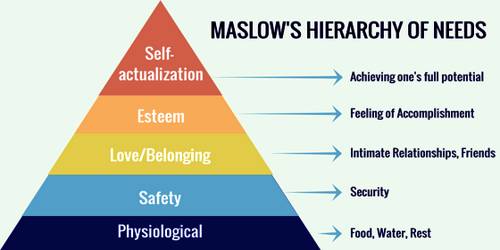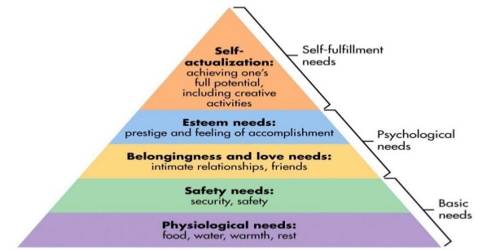Maslow’s Hierarchy needs theory for entrepreneurship development
Maslow’s theory is based on human needs. These needs are classified into a sequential priority from the lower to the higher. Abraham Maslow developed the Hierarchy of Needs model in 1940-50s USA, and the Hierarchy of Needs theory remains valid today for understanding human motivation, management training, and personal development. Maslow’s theory of motivation contends that people act to satisfy their unmet needs.

Figure: Maslow’s Need Hierarchy
(1) Physiological needs: These are the basic needs of human life. It includes needs for food, clothing, shelter, air, water and other necessities of life. An entrepreneur is also a man. He also needs to meet his physiological needs. Hence, he/she is motivated to work in the enterprise to meet the basic needs. In order to survive as an individual and as a species, these needs are the very basic ones and, therefore, are first on the hierarchy.
(2) Safety and security needs: After satisfying the physiological needs, the next needs felt are called safety and security needs. These are the needs for economic security and protection. from physical dangers. Meeting these needs requires more money. And hence, the entrepreneur is promoted to work more in his enterprise. Like physiological needs, these become inactive once they are satisfied. Safety can be somewhere to stay out of the elements.
(3) Social needs: All individuals want to be recognized and accepted by others. Likewise, an entrepreneur is motivated to interact with fellow entrepreneurs, his employees and others.
(4) Esteem needs: These needs refer to self-esteem and self-respect. In the case of entrepreneurs, the ownership and self-control over enterprise satisfies their esteem needs by giving them status, respect, reputation, and independence.
(5) Self-actualization: This refers to self-fulfillment. An entrepreneur can achieve self-actualization in being a successful entrepreneur.
According to Maslow Human being is never satisfied. If one need is satisfied, another need arises. For entrepreneurs, it is mainly social, esteem and self-actualization needs which motivate them to work more and more for satisfying them.













